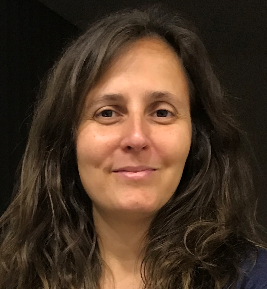Keynotes Speakers

|
Catarina Silva is Assistant Professor at the Department of Informatics Engineering of the University of Coimbra. She has a PhD degree in Computer Engineering, with 20 years of experience teaching Computer Engineering BSc and MSc, while also supervising MSc and PhD students. She is a senior researcher at the Adaptive Computation Group of CISUC with machine learning and pattern recognition as main areas of research. Skilled at managing different sized projects and scientific entrepreneurships, involving people with different backgrounds, namely faculty, students, alumni and companies. Author and co-author of 4 books, circa 20 journal articles and 50 conference papers. Scientific committee and paper reviewer of several conferences and journals. President of the General Assembly of the Portuguese association of pattern Recognition, IEEE senior member of the Computational Intelligence Society. IEEE chair of the Portuguese Section. |
|
Title: Interpretability, Privacy, and Ethics in Intelligent Systems Abstract: Computational intelligence is becoming increasingly responsible for decisions in various areas of our society, leading to the awareness of the associated power and potential. Accompanying this evolution, citizens have a general feeling of discomfort regarding the (decision support) process and a perception of its latent dangers. The fact that many algorithms work as a black box, that is, without access to the explanation or the internal rules that led a certain exit (decision) to be reached, has led to a set of initiatives, namely through the EU High-Level Expert Group on Artificial Intelligence (AI HLEG), that aim to make the algorithms more transparent and accountable. The new EU funding program for 2021-2027, Horizon Europe, directly defines the transversal need to apply open research data and FAIR (Findable, Accessible, Interoperable, Re-usable). The more comprehensive idea of “fair” algorithms is much more complex, and today it is actively under discussion, with the majority of researchers so far reaching the demotivating conclusion that it is not mathematically possible to satisfy all conditions of fairness. The AI HLEG published a proposal for the “Ethics Guidelines for Trustworthy AI” which argues that there should be a “human-centric” approach and highlights two main components for the definition of trust: (1) it must respect fundamental rights, applicable regulation and fundamental principles and values, ensuring an “ethical purpose” and (2) being technically robust and reliable, because, even with good intentions, the lack of technological mastery can cause unintended damage. In this context, although there is still a long way to go, this talk presents an overview within the scope of decision semantics, that is, the interpretability of the results of computational learning algorithms, with the aim of making its application possible with greater confidence in sensitive areas. |

|
Stefan Poslado PhD, Associate Prof., leads the IoT2US (Internet of Things to Ubiquitous, Computer, Science) Lab at QMUL. He has a PhD in medical sensing, is an Associate Professor / Senior Lecturer at the School of Electronic Engineering and Computer Science, Queen Mary University of London where he is a member of the Centre for Intelligent Sensing (CIS) and Cognitive Science research groups. His research and teaching interests include ubiquitous computing, Internet of Things (IoT); smart-environments, intelligent systems and IoT security and privacy. He has been the lead researcher for QMUL on over 15 international collaborative projects with industry, worth £17 million. He is the sole author of a leading book on Ubiquitous Computing: Smart Devices, Environments and Interaction, that has nearly 800 research citations and is in use for teaching by over 70 institutes worldwide across 6 continents. He has published over 100 research papers in the past decade in high-profile journals and conferences. He is on the editorial board of 3 journals and has organised 2 special issue journals. He is course director of the MSc in IoT at QMUL. He can also be found on Google Scholar, Orchid, ResearchGate and Linkedin. He has been a member of the IEEE since 2002. |
|
Title: Activities of Daily Life (ADL) Recognition via Locomotion & Location Determination Abstract: Our ability to perform our activities of daily life (ADL), e.g., ambulating, feeding, is an important indicator of our mental and physical health. The lack of this ability appears to be on the increase and causes a burden on society, in terms of disruptions, costs, safety issues, to others, etc. The baseline way to assess our health ability is to book an appointment for a professional medic to perform an infrequent, short duration, under artificial controlled conditions, health examination that is often not representative of our health under actual ADL conditions. In this talk we discuss how we can utilise locomotion & location determination techniques to perform a wider, actual, in-situ accurate assessment of ADLs. We review the challenges of monitoring ADLs, i.e., they are often performed indoors and we compare and contrast these monitoring techniques in terms of their strengths and weaknesses. |

|
Theo Tryfonas is a computer scientist by background working in the field of Smart Cities. His work focuses on urban applications of the Internet of Things in intelligent transport, smart buildings, emerging energy systems etc. looking particularly into the challenges of their connectivity, security and resilience. He is Associate Professor with the Department of Civil Engineering, University of Bristol in the UK and holds a doctorate in Informatics from Athens University of Economics and Business. He is a chartered member of BCS, the Chartered Institute for IT and a Fellow of the Royal Society for the encouragement of Arts, Manufactures and Commerce (RSA). |
|
Title: Smarter infrastructure monitoring and opportunities for innovation in asset management Abstract: Structural health monitoring is vital for infrastructure asset performance and can provide an abundance of data that could reveal more about the context of the asset use than originally intended. In this work we architect and deploy a low cost, low maintenance wireless sensor monitoring system at the Clifton Suspension Bridge, an iconic landmark of Bristol, and examine structural data with intend to identify and characterise patterns of traffic flowing through it. We discuss the challenges of building such a system, identify opportunities for innovation that extend beyond the health care monitoring of the structure and identify potential areas for applications of emerging technologies with multiple benefits. |